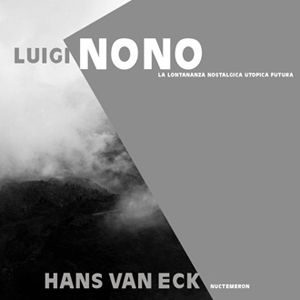Two works by the Italian avant-garde composer of classical music
Luigi Nono and the composer, sound artist and musicologist
Hans van Eck.
CD1 features Luigi Nono's La Lontananza Nostalgica Utopica Futura (1992), an original title, a unique aesthetic metaphor even: one could say that the past reflected in the present [nostalgica] brings about a creative utopia [utopica]; the desire for what is known becomes a vehicle for what will be possible [futura] through the medium of distance (performed by Tiziana Pintus, violin, and Hans van Eck, sound projection / The Schreck Ensemble).
CD2 features Hans van Eck's Nuctemeron (2008), a spiritual voyage as described in the text of Apollonius of Tyana (93 AD) which serves as the basis for the performance, connected by intermissions. Aspects of number symbolism, the four elements and the road to spiritual perfection have found their way into the music.
Luigi Nono (1924-1990) is an Italian
avant-garde composer of classical music who remains one of the most prominent composers of the 20th century. Nono studied with Malipiero at the Venice Conservatory (1941-5) and with Maderna and Scherchen, both of whom orientated him towards 12-note serialism (he married Schönberg's daughter Nuria in 1955). His avant-garde partisanship was inseparable from a commitment to socialism, twin aspects of a revolt against bourgeois culture: hence his avoidance of normal concert genres in favour of opera and electronic music, his frequent recourse to political texts and his work in bringing music to factories. His works include the operas
Intolleranza 1960 (1961) and
Al gran sole carico d'amore (1975),
The cantata Il canto sospeso (1956), orchestral works and tape pieces. Much of his music of the 1950s and 1960s has a fervent lyricism; later works tended to be more pessimistic (
Ein Gespenst geht um in der Welt, 1971).
Composer, sound artist and musicologist Hans van Eck is one of the founders of the Schreck-Ensemble, where he plays an important role as the artistic leader and sound-director of the ensemble.

